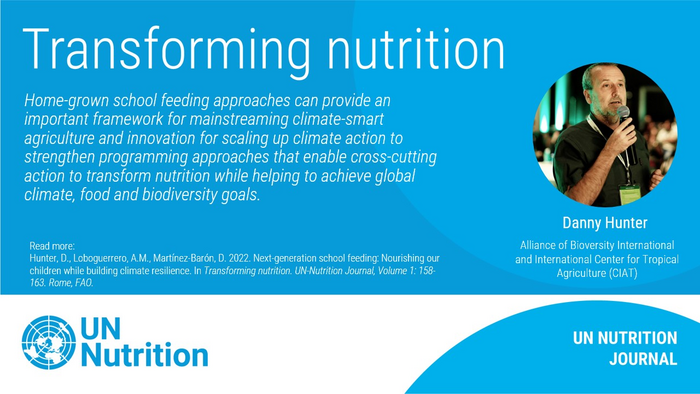According to UNICEF, school closures during the COVID-19 pandemic brought a decade’s growth in school feeding programmes to a dramatic halt, leaving about 370 million school children without access to their one reliable meal a day.

Credit: UN Nutrition
According to UNICEF, school closures during the COVID-19 pandemic brought a decade’s growth in school feeding programmes to a dramatic halt, leaving about 370 million school children without access to their one reliable meal a day.
“The Covid-19 whole pandemic highlighted the importance of food systems and that these supply chains are fragile and vulnerable… The only way that food was available was from farms and factories nearby,” said Deissy Martinez-Baron, Regional Leader for Climate Action in Latin America at the Alliance of Bioversity International and CIAT, based in Cali, Colombia.
In the paper, “Next-generation school feeding: Nourishing our children while building climate resilience”, published in UN Nutrition Journal #1 – Transforming Nutrition, Martinez-Baron and her co-authors argued that home grown school feeding (HGSF) supports local farmers while simultaneously conserving local biodiversity and providing culturally appropriate diets.
The idea would be that the free school meals given to children all over the world could be replaced with locally produced food, avoiding a repeat of what happened during the height of the Covid-19 pandemic.
“This approach could help shape demand, getting the market to respond,” she said, “ and the cost of strengthening these systems is offset by the savings the next time there is an external shock, like a supply chain disruption.”
One clear example, Martinez-Baron said, was the focus that Colombia’s new government had in simultaneously fixing the country’s school meal program, giving farmers a connection to a clear demand and empowering rural women, youths and children.
“The current government has a focus on family agriculture, strengthening the local production of food, so that rural populations that depend on agriculture can increase their quality of life,” she said, “One of the goals that the NDC has for Colombia is to make 1 million farmers more resilient to climate change… we are also addressing the goal.”
Martinez-Baron said women have to be involved, as the information that they get from training programs will be key to see what is the best way to nourish children.
“This approach needs to be implemented not only from the Ministries of Education or Agriculture, but also the Ministry of Health so we can improve children’s nutrition, to avoid health problems like diabetes and food diversity problems,” Martinez-Baron said, “We’ve found a way to use what we do at work to benefit our own families and society as a whole.”
Garden-based Learning
A more climate change-responsive approach to school feeding also provides opportunities to link to broader aspects of school education, especially through school garden-based learning.
School gardens can serve as learning labs for children to better understand the risks and impacts of climate change and to demonstrate ways of adapting.
“Children can also learn where food comes from and how food is grown and local governments can tailor training programs around school food programs,” Martinez-Baron said.
In addition to the paper, the Alliance has also previously published a book, “Agrobiodiversity, school gardens and healthy diets” which collects case studies from around the world. 75 contributors illustrate how school gardens empower future generations to make food choices that nurture the environment and human health.
According to the authors, the importance of gardens is that children are able to learn firsthand about nutritional, agricultural, and environmental issues, while developing life skills, knowledge, and habits that empower them to make healthy food choices.
It wasn’t immediately obvious to me that this was HGSF – would it make sense to introduce the phrase more directly in the previous paragraph?
DOI
10.4060/cc2805en
Method of Research
Case study
Article Title
UN-Nutrition Journal. Volume 1: Transforming nutrition
Article Publication Date
24-Nov-2022




